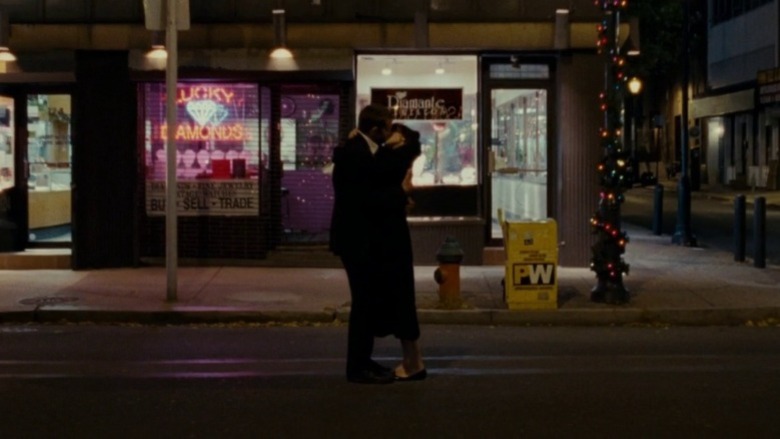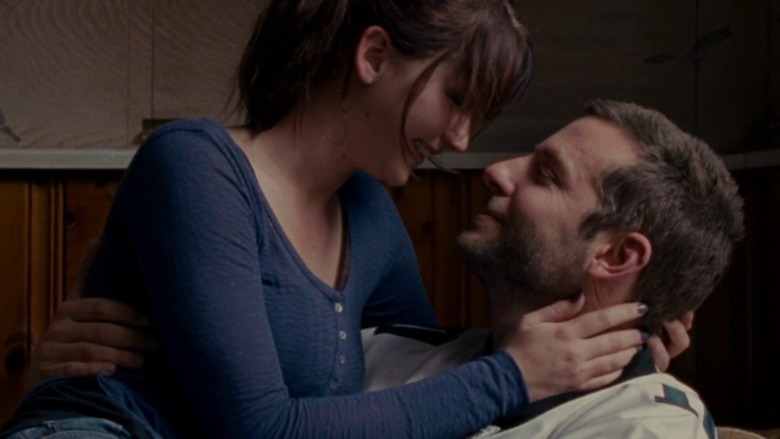The Ending Of Silver Linings Playbook Explained
The first screwball comedy in film history, 1934's It Happened One Night, won star Claudette Colbert the Academy Award for Best Actress. Perhaps that should have been a clearer indicator of what lay in store for Oscar night in February 2013, when pundits and cinephiles all over were wondering who could possibly have the edge in that year's murderers' row of Best Actress nominees. Between Jessica Chastain for Zero Dark Thirty, Emmanuelle Riva for Amour, Quvenzhané Wallis for Beasts of the Southern Wild, Naomi Watts for The Impossible, and Jennifer Lawrence for Silver Linings Playbook, it seemed like anyone could win, and anyone who won would be hard to argue against.
But Jennifer Lawrence, then a rising star, had the benefit of starring in a screwball comedy, a rare modern-day throwback to Old Hollywood's warp-speed romantic farces, with all the opportunity for showboating that entailed. Much like It Happened One Night, Silver Linings Playbook gave its star the chance to parade her outsized charisma, her precise sense of timing and physical movement, her deftness at motormouth verbal sparring, her ability to turn on a dime from comedy to heartbreak and back without ever seeming fake. In hindsight, her win was inevitable. And, though the movie itself is best remembered nowadays for that Oscar success, it deserves credit for getting the appeal of screwball comedy down pat in the first place. Only the exact right movie could have let Lawrence shine so bright — and the ending of Silver Linings Playbook aptly demonstrates why it was that movie.
Silver Linings Playbook ends in total chaos, and that's okay
In the climax of Silver Linings Playbook, much is riding on Pat (Bradley Cooper) and Tiffany (Lawrence)'s performance in the dance competition. If they score a 5 out of 10 or higher, Pat Sr. (Robert De Niro) will win back double the money he lost on a football bet. At the same time, the competition may be Pat's long-awaited opportunity to show his ex-wife Nikki (Brea Bee) that he has changed and healed. The complicating factor is that Tiffany is in love with Pat, and she panics the moment she sees Nikki in the audience and realizes what's at stake. When Pat finally manages to drag her back to the dance floor and go through with their routine, it's a tenuous win. In a moment of cinematic bliss, they score exactly 5 and celebrate wildly to the judges' utter bewilderment, but Tiffany still thinks Pat is about to leave her, so she leaves first. He runs after her. They come clean about their feelings, and they kiss.
There's never a moment in which Pat reassures Tiffany so she can dance without fear of what might happen. There's never a moment in which we see him make the decision to let Nikki go. The dance competition sequence is raucous and messy, much like the characters' emotional states during it; everything happens very fast, with few traditional screenwriting-manual chart points. But it doesn't matter, because the preceding 100 minutes of rapport between Pat and Tiffany have already convinced us that they belong together. The only thing that matters, ultimately, is Pat's run after her, the "I love you"s, the kiss. The narrative chaos doesn't muddy their romance: It foregrounds it as the only thing strong and true enough to make perfect sense in their world.
The ending of Silver Linings Playbook brings back the screwball comedy's humanist exuberance
This is the screwball comedy's expedient. The greatest examples of the genre are all predicated on a buildup of mayhem that never gets totally resolved or "paid off." Instead, the two leads lock eyes, become each other's reference points amidst the mayhem, and finally abscond together from the crisis in the end. It Happened One Night's Ellie ditches her wedding to be with Peter, no explanation given to the guests or the groom. His Girl Friday's Walter and Hildy decide abruptly to get married again, no matter if she's engaged to someone else. The Lady Eve's Jean gets back together with Charles, and there's no real need for her to tell him about the elaborate con in which she's embroiled him throughout the movie. The class tensions and plot conflicts remain, partly or fully. But they love each other, and that's enough.
For how hilariously snarky they can be, screwball comedies are, ultimately, a celebration of exactly that: the triumph of love, and by extension humanity, over the world's messiness. Man's circumstances are a grand mystery, but sometimes things align in just the right way. All it takes is someone else. Like its genre predecessors, Silver Linings Playbook ends just as it climaxes, with a brief, wordless epilogue — a casual family gathering, in which Pat and Tiffany are embracing and kissing in an armchair — serving as the closest thing to confirmation that the lovebirds will "make it work." We can't really tell if they will or not, any more than Pat Sr. can tell who's going to win the next Eagles game. What matters is their willingness to give it a shot, to look for a silver lining in the circumstances that brought them together.


